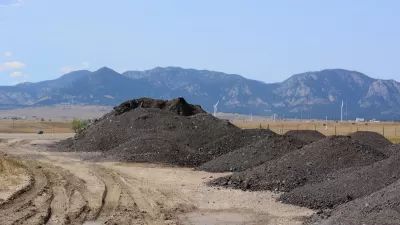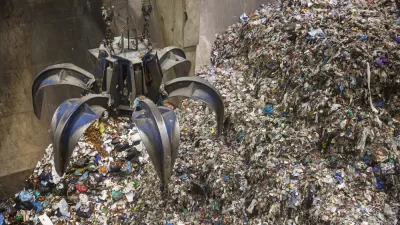Trouble in the global market means trouble at home when it comes to recycling. Municipalities are having trouble paying the extra cost for recycling programs as China stops accepting U.S. waste.

"Recycling, for decades an almost reflexive effort by American households and businesses to reduce waste and help the environment, is collapsing in many parts of the country," reports Michael Corkery.
Corkery cites "hundreds of towns and cities" across the country, including very large examples like Philadelphia and Memphis, that are giving up on recycling as costs spiral beyond feasibility.
"Prompting this nationwide reckoning is China, which until January 2018 had been a big buyer of recyclable material collected in the United States," according to Corkery. "That stopped when Chinese officials determined that too much trash was mixed in with recyclable materials like cardboard and certain plastics. After that, Thailand and India started to accept more imported scrap, but even they are imposing new restrictions."
Recycling companies are charging customers more as a result of the changes in the global market, and municipalities are faced with tough choices about how to cover the extra cost.
Still, sources cited in the article say recycling has been dysfunctional for much longer than the recent crisis indicates. "Analysts say many waste companies had historically viewed recycling as a 'loss leader,' offering the service largely to win over a municipality’s garbage business," according to Corkery.
FULL STORY: As Costs Skyrocket, More U.S. Cities Stop Recycling

Planetizen Federal Action Tracker
A weekly monitor of how Trump’s orders and actions are impacting planners and planning in America.

Map: Where Senate Republicans Want to Sell Your Public Lands
For public land advocates, the Senate Republicans’ proposal to sell millions of acres of public land in the West is “the biggest fight of their careers.”

Restaurant Patios Were a Pandemic Win — Why Were They so Hard to Keep?
Social distancing requirements and changes in travel patterns prompted cities to pilot new uses for street and sidewalk space. Then it got complicated.

Platform Pilsner: Vancouver Transit Agency Releases... a Beer?
TransLink will receive a portion of every sale of the four-pack.

Toronto Weighs Cheaper Transit, Parking Hikes for Major Events
Special event rates would take effect during large festivals, sports games and concerts to ‘discourage driving, manage congestion and free up space for transit.”

Berlin to Consider Car-Free Zone Larger Than Manhattan
The area bound by the 22-mile Ringbahn would still allow 12 uses of a private automobile per year per person, and several other exemptions.
Urban Design for Planners 1: Software Tools
This six-course series explores essential urban design concepts using open source software and equips planners with the tools they need to participate fully in the urban design process.
Planning for Universal Design
Learn the tools for implementing Universal Design in planning regulations.
Heyer Gruel & Associates PA
JM Goldson LLC
Custer County Colorado
City of Camden Redevelopment Agency
City of Astoria
Transportation Research & Education Center (TREC) at Portland State University
Camden Redevelopment Agency
City of Claremont
Municipality of Princeton (NJ)





























